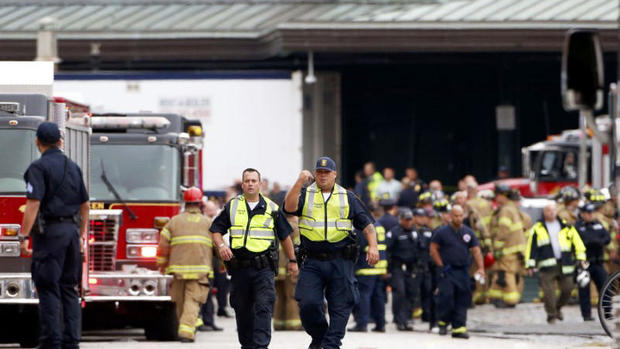Hoboken train crash investigation slowed by damage at New Jersey station
The search for answers continues into why a commuter train crashed through a station barrier in Hoboken, New Jersey, on Thursday morning.
One person was killed. More than 100 others were injured.
Officials are talking with members of the train crew but haven’t yet interviewed the engineer, and work continues to recover one of the train’s data recorders.
CBS News’ Kris Van Cleave reports that because of damage at the train station and potential asbestos contamination at the crash scene progress has been slow. Still, the investigation, which was expected to take up to a year to complete, was moving forward.
Investigators are working with the manufacturer of the data recorder recovered from the rear of the New Jersey Transit train to download key information.
It may be another day or two before they can access the crucial second recorder and video camera from the front cab.
“As soon as the site is safe, the NTSB will retrieve the other event recorder from the lead cab car as well as the forward-facing image recorder,” NTSB Vice Chair Bella Dinh-Zarr told reporters. “Once the NTSB has a successful download, investigators will use that information to validate speed.”
The engineer -- 48-year-old Thomas Gallagher -- is cooperating with authorities and has provided a blood sample that will be screened for drugs and alcohol. He will be formally interviewed as he recovers from his injuries.
Investigators are gathering and reviewing multiple sources of video and will examine the train for signs of mechanical failure.
There are signs that the brakes on at least one car were applied, but it’s unclear when that happened. Transportation expert Brigham McCown believes human error is a likely factor.
“It is possible the brakes malfunctioned, but typically that’s very rare on a train these days to have the brakes malfunction, and that would mean that the brakes malfunctioned on the locomotive itself, and that’s highly out of the ordinary,” he said.
Gallahger, a 29-year transit employee, is described as an experienced engineer.
Sources told CBS News so far the investigation has found no red flags in his background, work or medical history. He was treated and released from a hospital hours after the crash.
Ike Nahem, who worked as an Amtrak engineer for more than 25 years, told Van Cleave what can be done if a train is coming into a station too fast.
“Throw the train into emergency, apply all the braking power at your disposal and hopefully it would be enough fast enough that you could come to a stop before the bumping block or if not have minimal amount of damage,” he said.
While investigators are waiting to get complete access to the crash scene, commuters are wondering what this all means for their trip to work on Monday. Thousands use the station just across the Hudson River from Manhattan.
